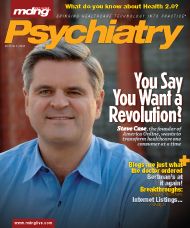TechSectors: Detecting Cognitive Impairment
Lawrence Catchpole, CEO, Zenda Technologies, explains a new scanning technology for assessing and monitoring mild cognitive impairment, Zenda's ImTECH platform for rapid assessment and DETECT test.
Lawrence Catchpole, CEO, Zenda Technologies, explains a new scanning technology for assessing and monitoring mild cognitive impairment, Zenda’s ImTECH platform for rapid assessment and DETECT test.
Can you explain how this new technology works?
ImTECH is a computer platform for giving immersive neuropsychological tests. It’s immersive in the sense that the visor (see picture) cuts out external visual and auditory distractions. DETECT is an abbreviated test (7—8 minutes) that runs on IMTech for mild cognitive impairment (MCI), and we believe it will work for mild traumatic brain injury (mTBI) as well.
Training is pretty minimal and mostly revolves around making sure the patient is comfortable with the visor and gets the simple two-button controller (see picture). Since this is a scanning tool as opposed to a diagnostic tool, guidance is provided for the doctor to use in incorporating output into their diagnosis, but the information the system provides makes that very simple. For MCI, it is able to show a patient’s individual score over time and compare it to a demographic equivalent for both normal and MCI patients.
What gap in the diagnosis of Alzheimer’s disease and cognitive impairment does the system fill?On PBS recently, I heard that in 95% of all Alzheimer’s diagnoses, the disease has already progressed to a moderate or severe stage. [DETECT is looking to detect mild cognitive impairment, one of the earliest signs of the disease.] As a screen included as part of a patient’s annual physical, the system will enable earlier diagnosis, when today’s drugs have the best effect.
Is the system designed to be used by primary care physicians who would then refer the patient to a psychiatrist, or by psychiatrists once a patient is suspected of having cognitive impairment, or both?
It is designed to be used by primary care physicians, but it of course can also be used by neurologists, psychiatrists, and geriatricians as well. The PCP can decide if a referral is the best course or perhaps they may be able to diagnose and treat—based on individual circumstances.
How does the system compare to the length and expense of written tests for detecting Alzheimer’s disease?Th e “gold standard” of neuropsychiatric testing is a series of pen-and-paper tests that take 60-90 minutes and require a trained administrator in a quiet room. Compare the cost of that with just adjusting a visor, starting the test, and coming back to the patient in 7 or 8 minutes. Also, the associated computers will automatically score and create the comparative output for the doctor. So, not only does this require much less of the healthcare professional’s time, but only a regular exam room is needed; during most visits, especially a physical, there are a number of 7-8-minute waiting periods between diff erent existing tests anyway. As we look at our aging population, many people already get annual physicals with a number of biological tests—EKGs; cholesterol, liver enzyme, and PSA tests; colonoscopies; etc. But today, no one is routinely given a test to monitor their mind to make sure both body and mind grow older together in a healthy fashion.
